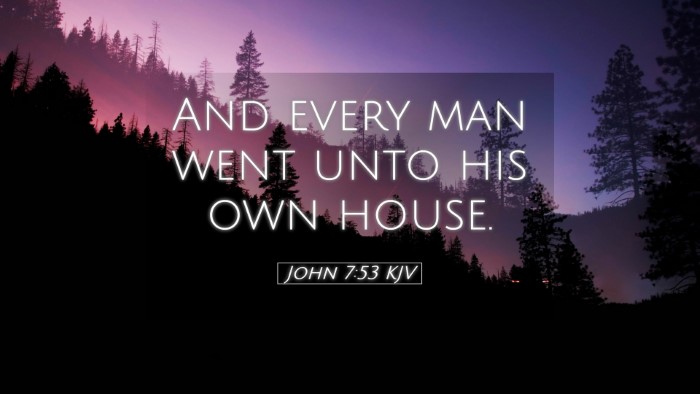John 7:53 states, "And every man went unto his own house." This verse serves as a transitional point in the Gospel of John, presenting a moment of decision and departure among the people following the teachings of Jesus. To engage with this text, we will combine insights from several notable public domain commentaries, providing a cumulative understanding for pastors, students, theologians, and Bible scholars.
Contextual Overview
This verse concludes a chapter filled with conflict and varying opinions about the identity of Jesus. After the dramatic teachings at the Feast of Tabernacles, the crowds find themselves in disarray regarding His authority and divinity. This moment also reflects the culmination of a series of dialogues that examine faith, identity, and revelation.
Insights from Matthew Henry
Matthew Henry, in his comprehensive commentary, reflects on the significance of the people's dispersal in this verse. He emphasizes that the departure of the people underscores a lack of commitment to follow Jesus entirely. While some were drawn to His teachings, their return to their homes signifies a retreat to familiar comforts rather than a willingness to engage deeper with Christ's mission.
Henry observes that this disengagement repels the genuine search for truth, as many were only following Jesus out of curiosity rather than conviction. His exposition highlights the perilous nature of superficial inquiry and the necessity of a transformative relationship with Christ.
Perspectives from Albert Barnes
Albert Barnes adds a reflective idea – the implications of the crowd's decisions. He notes that the return to their homes may symbolize the choice to adhere to established norms rather than embrace the radical teachings of Jesus. Barnes points out that these choices highlight a pivotal moment of indecision. The people recognized the profound nature of Christ’s claims but ultimately chose comfort and familiarity over faith and discipleship.
Furthermore, Barnes suggests the significance of collective decision-making and its relationship with individual faith. The phrase indicates not only personal choices but also broader social dynamics affecting belief, emphasizing the challenge that arises when public opinion clashes with divine truth.
Contributions from Adam Clarke
Adam Clarke provides further depth by exploring the implications of this verse on the socio-political environment of the time. He suggests that the exodus of the people may relate to the fear of repercussions for associating with Jesus, especially when tensions were high between the authorities and His followers. Clarke suggests that the people's departure reflects their apprehension and societal pressures influencing their faith decisions.
Clarke also reflects on the emotional landscape of the moment, noting the disappointment that followers might have felt seeing their potential leader rejected by the religious leaders of the day. The words "every man" illustrate a universality of struggle in understanding and accepting Jesus' revolutionary message.
Theological Reflections
From these interpretations, we can draw several theological reflections:
- The Nature of Commitment: The verse serves as a stark reminder about the nature of true commitment to Christ. Many may be intrigued by Jesus’ teachings but few will dare to enter fully into His revolutionary way.
- Social Dynamics of Faith: The commentary underscores how societal pressures can influence individual faith journeys. The decision to return home instead of following Jesus speaks volumes about how the external environment can hinder genuine belief.
- Public Opinion vs. Divine Truth: The tensions between what is accepted by the majority versus the truths Jesus embodies are highlighted. It invites a deeper reflection on the courage needed to stand for Christ in a world that may not be receptive.
Conclusion
John 7:53 encapsulates a moment of dismissal among the people – a pivotal verse steeped in layered meanings about faith, societal pressure, and personal decision-making. Through the lenses of Matthew Henry, Albert Barnes, and Adam Clarke, we see the importance of this passage in calling readers to evaluate their own commitment to Christ amidst competing societal narratives. Each insight invites scholars and practitioners alike to engage with the text meaningfully, prompting a search for deeper understanding and a more profound relationship with Jesus.


